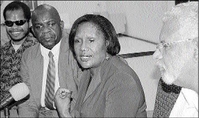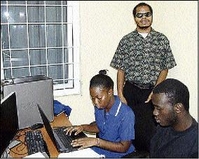Lions centre makes disabled feel at home
Published: Wednesday | November 11, 2009

Director of student services at the University of the West Indies (UWI), Mona, Dr Thelora Reynolds (second right), makes a point during an interview at the UWI-Mona Lions Centre for Students with Special Needs. Listening keenly (from left) are administrative assistant at the centre, Vivian Blake; head of the Centre for Disability Studies, Floyd Morris; and manager for the Office of Special Student Services, Peter O'Sullivan. - Contributed
At the heart of the University of the West Indies (UWI), Mona, is a place that students with various disabilities call 'home' - the UWI-Mona Lions Centre for Students with Special Needs.
Run by the Office of Special Student Services, the centre is viewed as a model, both locally and internationally, and is where students with disabilities go to socialise, do schoolwork and take examinations. It was established by the Lions Club of Mona and the University Development and Endowment Fund and caters to the more than 20 undergraduate and postgraduate students with vision, hearing and limb impairment, as well as learning disabilities.
More comfortable space
While students with disabilities always had a place all their own on the university's campus, the centre, which was upgraded and officially opened in June 2007, is a far cry from its predecessor.
President of the Lions Club of Mona, Milton Pinnock, says the club's association with students with disabilities at Mona began in 1998 when club members began working with blind students.
"As Lions Club, we would go there and read for them, and we discovered that the confined space that they were actually functioning in was not adequate for them, and we dreamt of a day when we could create a facility which would be more comfortable and in which they could achieve their purpose in a better way," he recalls.
The Lions Club and the Endowment Fund spent $43 million expanding the building and putting in six functional soundproof booths suitable for sitting examinations.
Member of the board of directors of the club, Dr Keith Peart, explains that the centre has "six soundproof or sound-reduction booths, which will permit the students to do their sound recordings. It will also allow them to write their examinations with the invigilator and the person actually doing the writing," he said.
The centre also has an embossing room to do Braille work and is fully equipped with high-quality recording equipment and other specialised equipment to aid students with various impairments.
Director of student services at the UWI, Dr Thelora Reynolds, says far more heart-warming than the modern advancement at the centre is the spirit of voluntarism and the "ethic of care that is displayed by our students". Indeed, the centre is supported by an army of volunteers numbering close to 200 from the UWI community as well as from the nearby University of Technology (UTech) and volunteers in the Jamaica Values and Attitudes Programme (JAMVAT)
The eyes and ears
The centre's administrative assistant, Vivian Blake, who is also visually impaired, views the volunteers as the "eyes and ears" of students with disabilities.
"Depending on the disability, for example, a blind person, the volunteer is that person's eyes ... or if you are in a wheelchair, it's almost like they are your feet. They will go where the wheelchair can't take you," Blake says.
He points out that students will drop by the centre periodically to see what tasks need to be done. For example, on the day JIS visited, there were volunteers scanning printed documents, which would be electronically converted to audio files accessible to the blind, while others were helping students complete research and other assignments.
Second-year psychology student, Dana-Gaye Weller, uses a wheelchair and is very grateful for the support offered by volunteers. She says university life would have been "much harder" without the help of volunteers who follow her to classes, take notes for her and help her with research. She adds that the centre provides a level of comfort for her as she has met a lot of friends at the facility.
Manager for the Office of Special Student Services, Peter O'Sullivan, explains that the main aim of the centre is to fill the various gaps which could affect disabled persons' ability to perform optimally as students.
Postgraduate study
One of the areas in which the centre has been making improvements is in postgraduate study by disabled students. Originally, students with disabilities opted to end their education at the UWI after their first degree. However, with the support given by the centre, students are now more likely to pursue their master's degrees and doctorates. In fact, last year, the UWI had one special-needs student graduating with a PhD and will this year have two graduating with their master's degrees.
Postgraduate student, Sean Harvey, says the centre is playing an instrumental role in helping him complete his master's degree in human services administration. The visually impaired student is also grateful for the part the centre plays in advocating for the needs of disabled students.
"It is from here that the advocacy is done as to what the university should provide for students with special needs and I have benefited from the results of their advocacy," he shares. Harvey is also happy for the new centre, which he says is more advanced and better equipped than the previous structure in which he was accommodated while pursuing his first degree in social work at the university.
The centre is also the base for the university's newest initiative geared towards the disabled community, the Centre for Disabilities Studies, which is expected to drive research into issues affecting the Caribbean's disabled population.
"There is a gap in the Caribbean as it relates to research and information on persons with disabilities, and this has made it extremely difficult for government policymakers to put in place the requisite policies and programmes for persons with disabilities," head of the Centre for Disabilities Studies, Floyd Morris, says.
Morris, a former minister of state in the Ministry of Labour and Social Security and who is visually challenged, says the centre will also be partnering with academia and organisations which cater to the needs of persons with disabilities, to advocate for greater implementation of policies and programmes for persons with disabilities.
The university has a very inclusive policy which ensures that all programmes open to the general school population is also open to persons with disabilities. As such, students participate in leadership and mentorship programmes, sports, clubs and other university activities.
Improving accessibility
To further enhance the ability of special-needs students to fully integrate into university life, the UWI is currently placing much emphasis on improving accessibility to buildings for students with mobility problems.
"Sometimes, for example, there is a little step up to a classroom or there is an area that needs to be ramped completely, to provide access. So, that's what we are busily trying to achieve this semester; to make the campus as friendly as possible to persons who have assistive devices to help them get around," O'Sullivan says.
For their part, members of the Lions Club of Mona are planning to set up a sight clinic at the university, providing eye screening and other services to students who might be experiencing vision problems.
The Lions Club of Mona will also be establishing a Resource Centre Foundation, through which it hopes to raise funds to offer scholarships and bursaries to disabled persons desirous of pursuing studies at the tertiary level.

Administrative assistant at the University of the West Indies-Mona Lions Centre for Students with Special Needs, Vivian Blake (standing), explains the services offered by the centre as University of Technology volunteer, Alecia McFarlane (left), assists first-year psychology student, Shavane Daley, with an assignment. - Contributed











